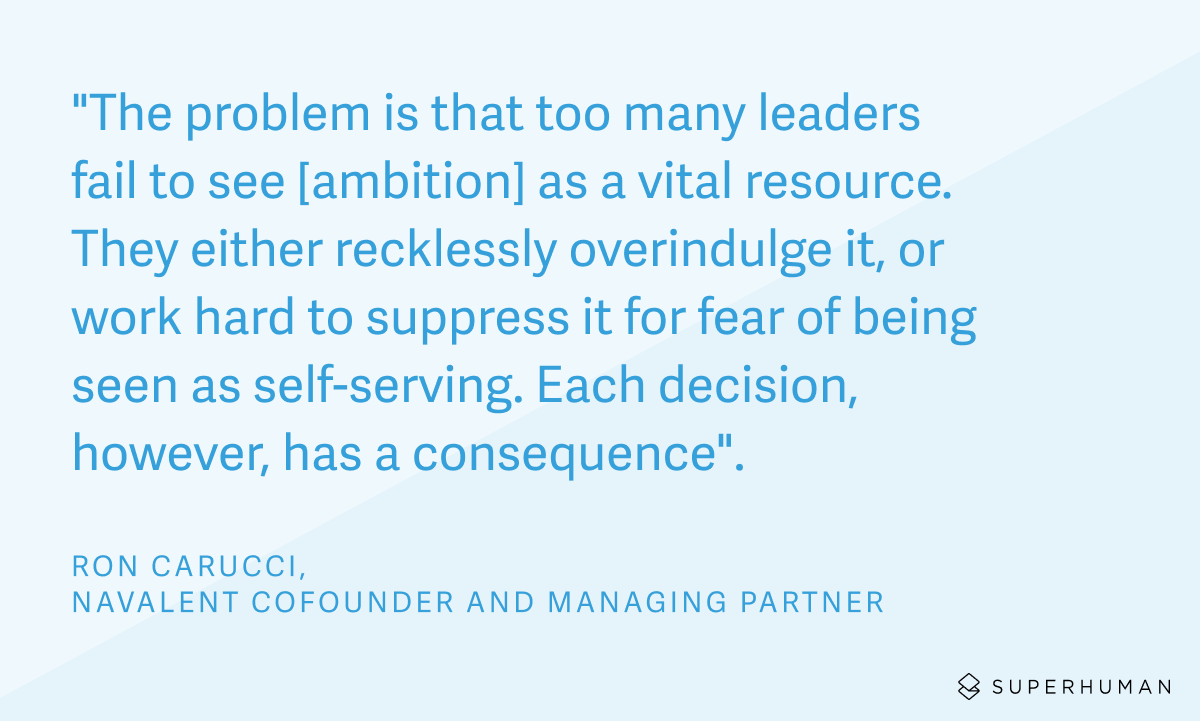
Navalent cofounder and managing partner Ron Carucci wrote for Harvard Business Review about serving on a committee to select a company's next CEO. He wrote:
The slate was down to two candidates, each of whom had unique strengths and limitations. The committee chair offered a fascinating observation of them, saying, 'One is too ambitious, and the other isn’t ambitious enough'.
When I probed to better understand her concerns, she described a host of traits spanning each candidate's degree of self-interest, achievement orientation, self-awareness, and concern for others. In short, the candidate labeled 'too ambitious' had been overly assertive about the financial growth of the company and the candidate labeled 'not ambitious enough' had spoken too much about their family and personal interests.
Carucci went on to point out a few problems that were taking place in this scenario, with one of them being "just how ineffective people can be at nurturing and expressing ambition".

Carucci is right that in the business world, we can have a strange relationship with ambition. It's a complex trait, and one that is often seen in a negative light.
But should it? Ambition is a crucial part of many people's success. Despite the dark side to how it's perceived, ambition can be seen as the fuel that powers someone to the heights of success! To reframe our thinking around ambition, we shouldn't think about how ambitious we should or shouldn't be. Instead, ask this important question: why is ambition important?
What is ambition?
There are a lot of different ways to define ambition, but the most common (and broadest) definition seems to be: when you have the desire and the determination to work toward and achieve great things. Ambition means having intrinsic motivation — an inner drive that helps you stay focused on achieving your goals.
Why is ambition sometimes seen as a bad thing?
One of the lessons from school that always stuck with me was about denotation and connotation. Denotation is what a word literally says — in this case, the above definition of ambition, which makes it sound like a pretty positive trait!
But connotation is the feeling a word evokes, and it's just as important a part of language. For many people, ambition comes with a negative connotation. They feel like it's a negative trait. But why?
In his HBR article, Carucci alludes to one reason: we tend to have a narrow view of what constitutes good or healthy ambition. He writes that ambition is nearly impossible to quantify — yet people tend to think negatively of those with a lower or higher level of ambition than they consider to be ideal.
According to Carucci:
In excess, ambition damages reputations, relationships, and can lead to catastrophic failure. On the other hand, too little ambition can make the person in question look lazy and unmotivated. Further, it can result in mediocre performance, boredom, and a bleak sense of futility.
In other words, a lack of ambition is bad. But too much ambition is also bad. People need just enough — but how much is that, and how do you even measure it? This type of thinking is common, but it turns positive ambition into a moving target that's difficult — if not impossible — to hit.
The issue is further complicated by how ambition is perceived among different demographics. For example, while ambition is often seen as a positive trait for white men, studies show that it's more likely to be perceived negatively when displayed by women or people of color.
Why is ambition important?
Despite its sometimes negative connotation, ambition is a key ingredient for many types of success. The importance of ambition becomes clear when we think about all the positive attributes it drives and contributes to.
Ambition helps us achieve goals
It's not always easy to set goals and work toward them. Identifying goals is challenging on its own. Then achieving them takes patience, perseverance, and continued hard work. This means many people give up before the finish line.
But ambition provides the internal drive that can help work toward long-term goals — and continue to set new goals once you've achieved initial success.
Optional Reading: 17 apps for goal tracking.
Ambition helps motivate us
One reason many people fail to achieve their goals is because of the hard work involved. But ambition comes with a strong desire to succeed, no matter what it takes. For many ambitious people, their ambition is what keeps them moving forward, even when they face challenges and setbacks. The intrinsic motivation that accompanies ambition keeps them on track.
Ambition drives personal growth and development
Ambition isn't always just about work and work-related goals. It can also help us work toward personal development and personal growth.
Ambition in your personal life probably looks different from ambition at work. It might involve:
- Setting and achieving goals related to being a better partner or parent
- Maintaining a healthy, active lifestyle
- Practicing mindfulness and self-care activities to feel your best
- Growing your confidence and self-esteem
Personal ambition probably looks a little different for everyone, but the concept is the same: an internal drive to always be growing and bettering yourself.
Ambition helps us overcome shortcomings and setbacks
As any ambitious person can attest, no path to success is free of roadblocks. There will always be setbacks — whether they're your own shortcomings or totally outside your control. But ambition gives you the drive it takes to get back up and keep working, even after a setback — or multiple.
5 ambitious people — and what we can learn from them
When we hear stories of ambitious people succeeding, it's usually not just because they're ambitious. Ambition goes hand-in-hand with a number of other traits — perseverance, resilience, long-term and big-picture thinking, and more — that also help people succeed in their goals.
But in addition to all their other positive traits, the people in these stories are undoubtedly ambitious. Here's what we can learn from them.

Arash Ferdowsi
Dropbox cofounder Arash Ferdowsi didn't always dream of being one of the most successful entrepreneurs in the world. In fact, when he left his hometown of Kansas City to attend MIT, his ultimate goal was to work as a programmer for a well-known tech company like Google.
But while at MIT, he met Drew Houston. The two shared a frustration with the inefficiency that was rampant in modern workplaces, where many people wasted productive time doing "work about work". They wanted to streamline how people share and store files, so they built Dropbox, and the rest is history.
What we can learn from Arash: Arash went to MIT with a goal he never actually achieved — to work for Google. That's because as his skills and experience grew, so did his own ambition. He realized that he could accomplish more — and make more of an impact on the world — by working for himself to build his own ideas, rather than working for someone else.
Arash's success is a great lesson for all of us: as you grow, so will your goals. Your definition of success will change over time. Failing to reach a goal isn't necessarily a failure — if it's because you've changed course to work toward a different goal.
Arianna Huffington
Today, Arianna Huffington is a household name following the worldwide success of her blog-turned-news site, The Huffington Post. What many people don't know about Arianna, though, is that she grew up in Greece, where she didn't speak any English until she was a teenager. In an interview with her alma mater, she said:
I started learning English when I was 15, after I happened to see a photo of Cambridge while I was walking home from school one day. The photo spoke to me in a deep way, and I was convinced I absolutely had to go there. So when I got home, I told my mother.
It was a ridiculous goal for many reasons. We didn't have any money, I'd never even been out of Greece and, worst of all, I spoke no English. But instead of laughing at me, like most people did, my mother's reaction was: let's make it happen. So she found an intensive class for me to start learning English. And because of her unconditional love and support, and a lot of hard work, it did happen.
What we can learn from Arianna: Many obstacles stood in between Arianna's upbringing and the success of The Huffington Post. But what we can take away from her exceptional story is that sometimes, the best thing you can do is to take the first step. For Arianna, that meant not worrying about living in Greece and having no money for tuition. She wanted to go to Cambridge, and the first step was to learn English, which she did.
Oprah Winfrey
Many people already know about the obstacles that Oprah overcame on her way to becoming a media mogul, including getting fired from her first job as an evening news reporter. What many people don't know is that Oprah later landed her dream job at 60 Minutes, but ended up leaving — for a very good reason.
In an interview, Oprah explained that her bosses at the show wanted her to tone herself down and be less emotional while reporting.
"I was working on pulling myself down and flattening out my personality — which, for me, is actually not such a good thing," she recalled. So, she left.
What we can learn from Oprah: The lesson we can all learn from Oprah's experience is one that's been echoed by other ambitious women. As Dolly Parton put it, "Don't tone down your sparkle for anyone." As Melinda French Gates said, "Seek out people and environments that empower you to be nothing but yourself."
The unfortunate truth is that women face more negative perceptions about their ambition than men. But should that be a reason to be less ambitious? Oprah, Dolly, and Melinda all agree that the answer is no.
Walt Disney
Walt Disney is famous for his clear vision. He wanted everything he created to change the world, whether it was the first feature-length animated movies, or a groundbreaking theme park that is, today, one of the top tourist destinations on the globe.
But just because Walt was filled with ambition doesn't mean he always succeeded. While he knew what he wanted Walt Disney World to be, his first iteration of the park made him "heartsick" because it was filled with "seedy hotels, garish advertisements".
But that disappointment is why Disney World did actually change the world. Walt realized that in order to bring his vision to life, he couldn't just build a theme park — he needed to build the entire world around it. Disney World became more than just a park, and instead is essentially its own small city, with shopping centers, hotels, and more. This allows complete control over guests' experiences, laying the foundation for the magic that Disney vacations are known for.
What we can learn from Walt: Walt learned that sometimes, there are no shortcuts on the way to success. To achieve his vision, he needed to do more work than he anticipated — as is often the case for other people and other situations.
Daymond John
Daymond John built his clothing brand, FUBU, from nothing. In the early days, he used his mom's house as a factory, used graffiti as marketing, and smooth-talked his way onto rap video sets to try to convince famous artists to wear his pieces.
And it worked. FUBU brought in $350 million in annual sales at its peak, while Daymond enjoyed other successes (like being part of the panel on Shark Tank).
In an interview on Business Insider's "Success! How I Did It" podcast, Daymond opened up about how his strong work ethic was instilled in him from a very early age. He explained:
Well, my mother and my dad were both very hardworking people. I look back and I say, "You know? I didn't really listen to my mother when I was growing up," but I ended up doing everything she did. Always working and always trying to find like-minded people around her. Always educating herself.
What we can learn from Daymond: Ambition might seem like a trait some people are born with, but it can certainly be learned. As Daymond can attest, by surrounding himself with hardworking people (and following his mom's example after she did the same), he set the stage for his own success in life.






